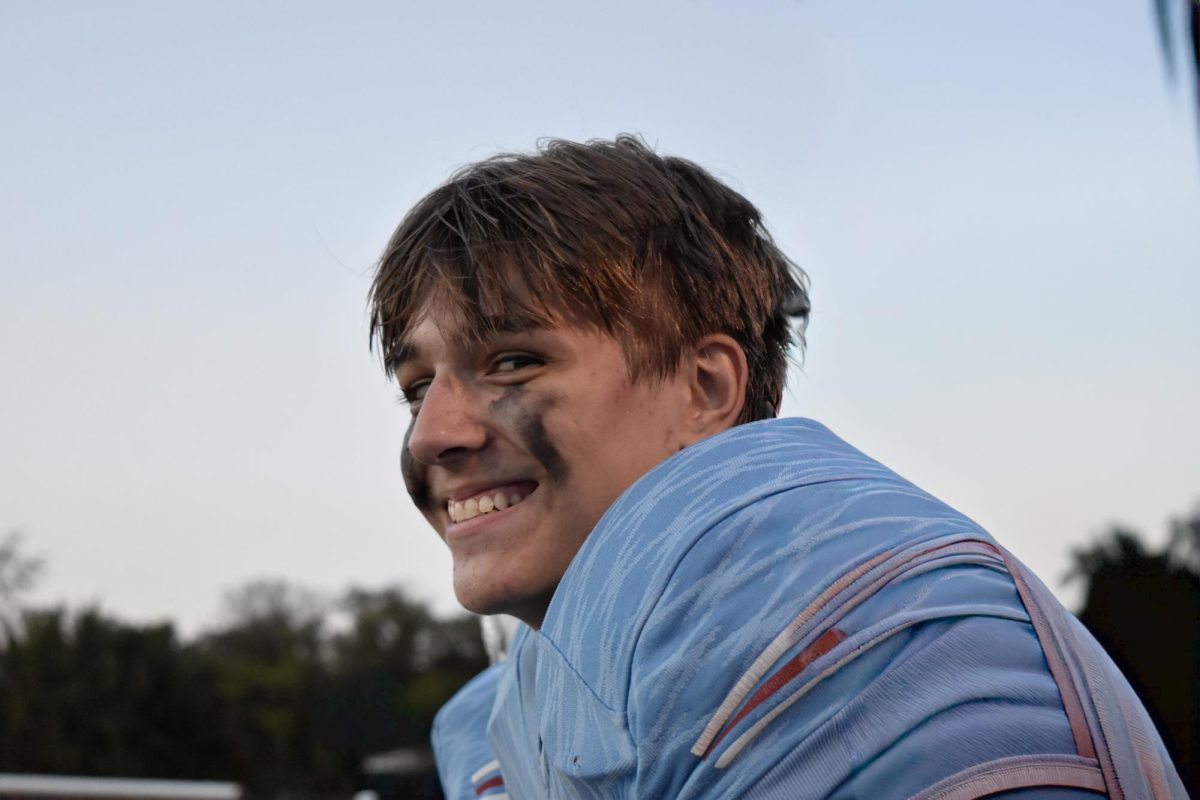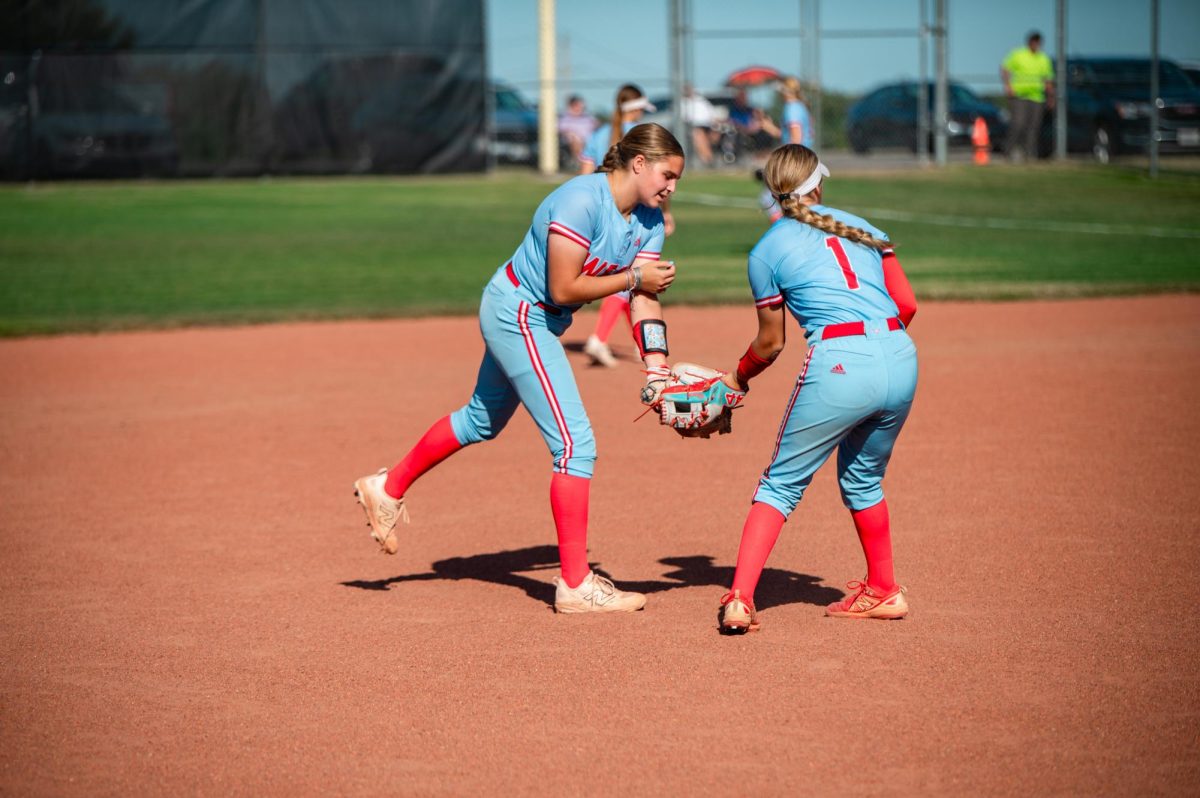Violins swelled, smoke cleared and Imagine Dragons lead singer Dan Reynolds emerged in all-white clothing from behind the stage-crafted veil as the words of the song that had first made its way onto the radio merely nine months before as the attendees (and viewers) of the 2014 Grammy Awards braced themselves for yet another captivating performance of “Radioactive.” ‘Angelic’ was the word that rang through my mind, presumably due to the overwhelming amount of bright white captivated my vision. “I’m breaking in, shaping up/ then checking out on the prison bus/ This is it, the apocalypse” he sang the familiar words that were abruptly interrupted by “YAWK! YAWK! YAWK! YAWK!”(imagine the vocalization of a car alarm) as the beginning of Kendrick Lamar’s “m.A.A.d. city” had me up in arms with complaints.
“What have they done to my band?” I thought scornfully of how the music industry had adulterated the band that I had discovered in August of 2012, right before the release of their first full-length album, Night Visions, the following month. Along with the clear juxtaposition of two sounds (alternative rock and rap) that needed to stay separate, the stage had erupted in a ball of headbanging and red smoke that nearly equated Lamar with anything that was the opposite of the saint-like beginning of the performance. Their two years as internationally renowned rock stars had changed them to such an extent that they no longer fit my musical palate, so to speak.
But the more I listened, the more increasingly apparent it became that there was something my jaded and musical elitist mindset had missed. Other than the fact that, musically, the two songs lent themselves to compliment each other, the messages and undertones behind them had some striking similarities.
I had written Lamar off as “just another rapper” complaining about how hard his one and a half million dollar net worth life was, and how he had come so far in his life to that point, despite all of the hate and disrespect he got from those around him. But “m.A.A.d. city” didn’t contain the same superficial rap themes of obscenity, drugs and violence— well, at least not in the conventional manner that rap music does.
Lamar’s lyrics reveal the prevalence of all of the negative influences in his hometown of Compton, CA. He “[takes] a trip down memory lane” recalling details of how he witnessed an intentional murder at a burger joint by an undisclosed person (possibly his uncle) and how that changed the way he saw that person — all of this at age nine. He goes on about his broken trust for a person who “killed his cousin back in ‘94” and how his job as a security guard was terminated because his friends convinced him to stage a robbery.
To my surprise, the song blatantly mentions his disposition towards drug use, all because of his negative first experience. He even prefaces the song with the idea that the lyrics are not about “slinging crack or cocaine.” The song is truly embodied by the lyrics, “You know the reasons but still won’t ever know my life/ Kendrick aka Compton’s human sacrifice.”
After the song and the singer had basically been basically completely overturned for me, it’s similarities, while addressing two entirely different scenarios, to “Radioactive” started to shine through. Reynolds’s song is about an awakening or rebirth that follows a dark time which, for him, was marked by severe depression, ADD and anxiety. The song came from the emergence of a long spell of struggling with the three diseases. And while the diseases may not have been as apparent as Lamar’s life situation illustrated in “m.A.A.d. city,” the two songwriters had equally circumstantially insurmountable problems; and both, therefore, came to the same solution — music.
And the performance at the Grammy’s conveyed the story of their struggles that drove their shared passion. And that’s why music, any music, can be powerful, moving and captivating, and therefore deserves recognition. Typically, music and musicians win awards such as Record of the Year not because they are pre-formulated, communally written songs, but because they have meaning that drive them. They connect with people on more than just an auditory or visual level; the emotion behind the songs finds its way through the words and into the hearts and minds of those who chose to listen and care.
And so I amended my former thoughts about what the industry had done to the Imagine Dragons. Reynolds was still in fact the same humble guy from Nevada that started the band with a few of his friends back in 2008. And not only was that true, but he had gone a step further and found yet another new and surprising way to add more meaning and emotion to his performance.
During the height of the instrumental, Lamar broke out into freestyle verse where he mentioned the “plan b [was] to win [our] hearts” during their performance. And I can honestly say that he did.


![Helping a customer, print room assistant Gretchen Williams operates her booth at the West High Craft Fair from Oct. 25-26. This was Williams’ first time participating in the Craft Fair with her new craft shop, Gs Beaded Boutique. “People have always said, over the years, ‘you should open something.’ [I replied that] I would rather just make [my crafts as] gifts for people. I just started [the online store] up, and it's been okay. I'm always surprised [by] how many views I get and [the] people from different states buying things; somebody from Alaska bought something the other day.”](https://pwestpathfinder.com/wp-content/uploads/2025/11/DSC0451-2-1200x799.jpg)
![Between lights, smoke and a captive audience of students, science teacher Joel Anderson conducts his annual Halloween show in class on Oct. 31. Anderson has performed the Halloween show every year for 27 years, since he started teaching in 1999. “[My favorite part about the show] is getting students excited about it and seeing their level of anticipation. After the students see it, they realize that [I] put a lot of time and effort into it,” Anderson said. “They also end up learning because I sneak some chemistry into the [show] as well. So, it’s a whole bunch wrapped up in a 15 or 20-minute package. It’s really scary.”](https://pwestpathfinder.com/wp-content/uploads/2025/11/DSC_9047-Enhanced-NR-1200x798.jpg)


![Smiling in a sea of Longhorns, Fox 2 reporter Ty Hawkins joins junior Darren Young during the morning Oct. 3 pep rally. The last time West was featured in this segment was 2011. “[I hope people see this and think] if you come to [Parkway] West, you will have the time of your life because there are so many fun activities to do that make it feel like you belong here. I was surprised so many people attended, but it was a lot of fun,” Young said.](https://pwestpathfinder.com/wp-content/uploads/2025/10/Edited2-1200x798.jpg)

![Blue lights shining brightly, senior Riley Creely beatboxes into the microphone. Creely and the group began the performance in front of the blue lights, sparking interest from the audience. “The pep rally performance was fun. I got to beatbox for the first half of the song, which was hype. I liked to look into the student section [while I performed],” Creely said.](https://pwestpathfinder.com/wp-content/uploads/2025/09/DSC_5085-Enhanced-NR-1200x799.jpg)

![Hugging senior Ella Wheeler, senior Jamaya Love beams after scoring a touchdown at the Powderpuff football game on Sept. 11, putting the seniors on the scoreboard with a score of 6-2 above the juniors. The seniors went on to capture the victory with a final score of 12-2. “I was actually gassed [at this moment]. I was so tired. But, everyone on the sideline, all my teammates and everybody in the stands were cheering,” Love said.](https://pwestpathfinder.com/wp-content/uploads/2025/09/DSC1735-Enhanced-NR-2-1200x799.jpg)
![Raising her hands in the air, freshman Jillian Sternhagen follows Mr. Mooney’s lead during an activity Aug. 15 at freshman orientation. Surrounded by other freshmen, Sternhagen learned an “A O E day” chant to help remember their new weekly high school schedule. Students participated in several activities to get to know each other, the school and the upperclassmen. “We got to tour the school and learn where everything in our schedule is. The energy [at orientation] was fun; the leaders were peppy and got us excited,” Sternhagen said.](https://pwestpathfinder.com/wp-content/uploads/2025/08/DSC_0145-1200x798.jpg)
